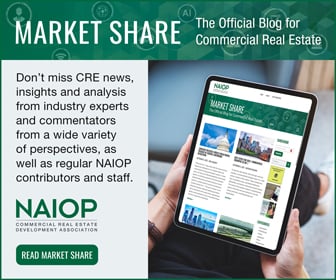The president and CEO of R.J. Kelly (RJK), located in Burlington, Massachusetts, discusses the evolution of his family’s company, his approach to leadership and what it takes to succeed in commercial real estate.
Development: Please tell us about RJK.
Brandon Kelly: We’re a vertically integrated investment, development, management and construction firm focused on maximizing returns for our investors and creating value for our tenants. Our roots are local — New England is our home — but we’re asset-class agnostic. We move between industrial, flex, office, retail and storage, and we dabble in multifamily — wherever we see value and can leverage our platform.

Brandon Kelly
We are basis investors [investors that buy into a property based on its cost basis], and when we combine excellent basis with our vertically integrated platform, we realize the best investment performance. We’ve grown from half a million to 6 million square feet under management in the past 12 years. We acquire and dispose when the time is right, but we are always tactical. We are a true operator that immerses ourselves in our investments. The key is being nimble and never getting stuck in one lane.
My father, Richard J. Kelly, started the company. His first job was plucking corn on a farm. Early on, he realized he could do more than pick corn because he was industrious and good with his hands. He started building chicken coops, then moved on to framing houses after discovering he had a knack for it. Eventually, someone loaned him the money to build his first spec house, which he completed in the 1950s. From there, he kept recycling his equity into new investments, whether it was homes, small strip retail or, in the 1970s and 1980s, office buildings. He was basically a one-man band, with a few people working alongside him in construction and some office staff supporting him. Through all that, he was able to build a good life for himself and his family. He always took a lot of pride in what he built and wanted his children to be involved in the business. I am the youngest of his six children.
Development: When did you decide to get into the family business?
Kelly: After college, I moved to Boulder, Colorado, but when my father had a minor health scare in 1998, I came back to help him. I left again because I wasn’t sure there was enough opportunity for growth in the business. I returned in 2001 when it was clear the company needed to evolve. Back then, we were still a small operation, but I saw the potential if we shifted our mindset and brought in outside capital and new ideas. My experience in the NAIOP National Forums was one of the primary catalysts for RJK’s shift to working with institutional capital, which has been critical to our current trajectory.
Development: Are other family members involved in the business? What about the next generation?
Kelly: My brother, Scott Kelly, has been here for a lot of RJK’s growth, but he’s retiring this year. We started as a family business, but we’ve evolved beyond that. Everyone who works here today is part of the R.J. Kelly family. We believe in meritocracy. If our children want to work here, they’ll first have to earn it working outside the company.
Development: You co-founded RJK’s storage division, which has helped the business to grow over the years. How did that come about?
Kelly: In the late 1990s/early 2000s, we had a broken strip mall, 127,000 square feet, with a lot of vacancy. My dad built it, but we lost some anchor tenants before we even opened the doors. We’d heard about self-storage, so when I came back to the business, that was the first thing we tried. We converted part of the building, and it turned out to be a great asset class.
Back then, people looked at you like you had three heads when you said you were in self-storage, but now there’s a wall of capital chasing it. Over the years, we’ve built, bought and sold a lot of storage. It’s only about 10% of our portfolio now, but it played a key role in our transformation. In fact, our first large-scale portfolio aggregation was in the self-storage space.
Development: What is your primary role as CEO?
Kelly: My main job is to focus where I can create the most value for our investors and the platform. Sometimes that means being deep in asset management or acquisitions; other times, it’s construction or repositioning a building. As we’ve grown, my challenge has been to step out of the weeds and let our team be more autonomous. The more we grow, the more I have to give up. That’s not always easy for a hands-on person like me.
Development: RJK has experienced tremendous growth over the last decade. What has been your greatest leadership challenge?
Kelly: Managing growth while ensuring we have the right systems and people in place. As you scale, you must provide autonomy so people can execute while simultaneously ensuring that everything gets done right. It’s a balancing act: letting go where you can but stepping in when you must.
The hardest part is getting out of the weeds and focusing on big-picture value creation. Fortunately, we’ve created a company and a culture that attracts like-minded CRE professionals who want to work at a firm where they can truly be engaged with our investments. Many of our senior team members came from the best and brightest institutional firms. They had successful careers there but may have been stuck in one silo. At our firm, everyone understands the nature of an operator and how fun and exciting commercial real estate can be when you have the mindset of an owner.
Development: What do you look for when hiring senior staff?
Kelly: The right person must fit our culture — no big egos, no lone wolves. We want autonomous individuals who are also team players and have humility. If you get the wrong person in a key role, it can be a disaster. When that happens, you must be willing to pivot quickly.
Development: How do you define leadership at RJK?
Kelly: I try to be an engaged leader — someone who listens but is also decisive. Leadership means providing autonomy but also guidance. I care deeply about everyone in the company and want them to realize their own success, whatever that looks like.
Development: When internal conflicts arise or mistakes are made, how do you handle them?
Kelly: We are decisive and get to the root cause. We don’t vilify people for making mistakes, but we don’t tolerate repeating the same mistakes. Everyone must learn from errors and own them. It’s about creating a learning environment, not a blaming environment. What matters is how you grow from your mistakes.
Development: What is your outlook for commercial real estate in your market over the next few months?
Kelly: We’re optimistic because we’re nimble. We don’t have a fund structure or a set lane. We go where we see opportunities, whether that’s in office, industrial, flex, retail, storage or multifamily. There is always opportunity — the challenge is finding it.
We have very high convictions about our investments. When we see opportunity, we act swiftly to have as large an impact as a market will support. Whether it is a basis buy of a well-located office building in Boston that needs some new energy or a wholesale pivot to a market with upside to uncover, the key is staying ahead of the herd, not chasing yesterday’s trend. For example, we started to invest heavily in New Hampshire in early 2021. We now own almost 3 million square feet of what we like to call “essential industrial” in and around the major New Hampshire markets.
Development: What is the best advice you’ve received in your 35 years in the business?
Kelly: The best advice I have received is to “read on” and “dig deeper.” Never accept things at face value. Another piece of advice is that there is always enough business to go around for the good people in the market. Therefore, work with good people, treat people right, and take the long view. And a third important piece of advice is never think you’re too good to do any job in the company. I still pick up trash outside our buildings. Ownership is for everyone.
Development: What’s the most important lesson you’ve learned?
Kelly: To learn from your mistakes and not take yourself too seriously. Have humility and be honest when you don’t know something. Listen to your team — they will see things you don’t.
Development: You’re very active in your community, as was your father. Why is that important to you?
Kelly: If we can use our talent and success to help others, we will do that. My mother has lived with multiple sclerosis since 1974, so we support MS research, cancer research and many groups.
Development: How do you relax away from work?
Kelly: Family comes first. I have two teenage daughters, so I spend time with them when they’ll let me. We’re active skiers, mountain bikers, fishers and travelers. I love to get out with my wife and kids. Staying healthy and sharp is important to me, so at the end of the day, you’ll probably find me on my bike in the woods.
Ron Derven is a contributing editor to Development magazine.






